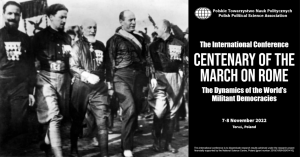October 2022 marks the 100th anniversary of the March on Rome of the fascist militias, which ended with the takeover of power by Benito Mussolini. It was the first time post-World War I anti-democratic forces won in modern Western European societies. However, this event had been preceded by the Bolshevik coup five years earlier in Russia. Despite being external to modern European societies, it influenced Europe and European contentious politics at least as strong as the March on Rome.
We would like to address new research questions on the occasion of these two anniversaries. To what extent has the struggle between democratic and anti-democratic forces determined the fate of Europe and the world over the last hundred years? Is it possible and meaningful to define democratic and anti-democratic forces accurately and exhaustively? To what extent have main political groups been democratic, and to what extent non-democratic? How have the organizational structures and political thinking of the most important political groups participating in this struggle changed, and to what extent have they remained unchanged? To what extent have the actions of political actors increased or decreased the ranges and levels of the sovereignty of the ruling classes, including the political nation? What are the social and political consequences of contention between democratic, undemocratic, and anti-democratic actors? Why have contemporary political regimes become vulnerable to anti-democratic threats such as hybrid interference, electoral meddling, and populist actors?
These are only the most critical questions regarding the condition of the political world, mainly European political structures, over the last hundred years.
We invite you to try to answer the above and similar questions during the international conference on 7-8 November 2022, which will take place in Toruń and online. Please send your submissions via registration form (up to 150 words) by 30 September 2022.
We plan to circulate the first versions of the texts among conference participants before the conference begins to stimulate in-depth discussion and embrace the opportunity to work on our papers. Please send them by 30 October 2022. We plan to publish all texts that meet the requirements as an edited book with a reputable international publisher.
Deadlines:
Submission of proposal for registration within the panels: 30 September 2022
Confirmation of registration: 5 October 2022
Submission of papers: 30 October 2022
Confirmation of the papers’ registrations: 1 November 2022
Conference fees:
EUR 100/PLN 450 – in-person participation
PLN 400 – in-person participation of a member of Polish Political Science Association
EUR 10/PLN 50 – online participation
PLN 45 – online participation of a member of Polish Political Science Association
Conference fees should be paid until 5 October 2022 with a bank transfer:
Polish Society of Political Sciences
ul. Krakowskie Przedmieście 26/28
00-927 Warsaw
Bank:
PKO Bank Polski
IBAN: PL 60 1020 1156 0000 7102 0064 8402
SWIFT (BIC code): BPKOPLPW
The conference fee includes:
1) PERSONAL PARTICIPATION: accommodation for one night, meals during the conference (coffee breaks, lunches, conference dinner), certificate of participation
2) ONLINE PARTICIPATION: certificate of participation
Registration form: https://forms.gle/CxZVa6zxaHWshHB87
Conference Scientific Chairs:
Professor Roman Bäcker
Associate Professor Joanna Rak
Organizing Committee:
Kamila Rezmer-Płotka, MA
Maciej Skrzypek, MA
This international conference is to disseminate research results achieved under the research project financially supported by the National Science Centre, Poland [grant number 2018/31/B/HS5/01410].
